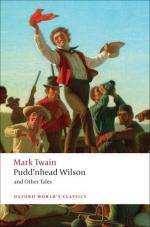He him reversed and the unhappy belched two handfuls of shot (et le malheureux, etc.). When Smiley recognised how it was, he was like mad. He deposited his frog by the earth and ran after that individual, but he not him caught never.
It may be that there are people who can translate better than I can, but I am not acquainted with them.
So ends the private and public history of the Jumping Frog of Calaveras County, an incident which has this unique feature about it—that it is both old and new, a ‘chestnut’ and not a ‘chestnut;’ for it was original when it happened two thousand years ago, and was again original when it happened in California in our own time.
P.S.
London, July, 1900.—Twice, recently, I have been asked this question:
‘Have you seen the Greek version of the “Jumping Frog"?’
And twice I have answered—’No.’
‘Has Professor Van Dyke seen it?’
‘I suppose so.’
‘Then you supposition is at fault.’
‘Why?’
‘Because there isn’t any such version.’
’Do you mean to intimate that the tale is modern, and not borrowed from some ancient Greek book.’
’Yes. It is not permissible for any but the very young and innocent to be so easily beguiled as you and Van Dyke have been.’
‘Do you mean that we have fallen a prey to our ignorance and simplicity?’
‘Yes. Is Van Dyke a Greek scholar?’
‘I believe so.’
’Then he knew where to find the ancient Greek version if one existed. Why didn’t he look? Why did he jump to conclusions?’
‘I don’t know. And was it worth the trouble, anyway?’
As it turns out, now, it was not claimed that the story had been translated from the Greek. It had its place among other uncredited stories, and was there to be turned into Greek by students of that language. ’Greek Prose Composition’—that title is what made the confusion. It seemed to mean that the originals were Greek. It was not well chosen, for it was pretty sure to mislead.
Thus vanishes the Greek Frog, and I am sorry: for he loomed fine and grand across the sweep of the ages, and I took a great pride in him.
M.T.
[1] Sidgwick, Greek Prose Composition, page 116
MY MILITARY CAMPAIGN
You have heard from a great many people who did something in the war; is it not fair and right that you listen a little moment to one who started out to do something in it, but didn’t? Thousands entered the war, got just a taste of it, and then stepped out again, permanently. These, by their very numbers, are respectable, and are therefore entitled to a sort of voice—not a loud one, but a modest one; not a boastful one, but an apologetic one. They ought not to be allowed much space among better people—people who did something—I grant that; but they ought at least to be allowed to state why they didn’t do anything, and also to explain the process by which they didn’t do anything. Surely this kind of light must have a sort of value.




